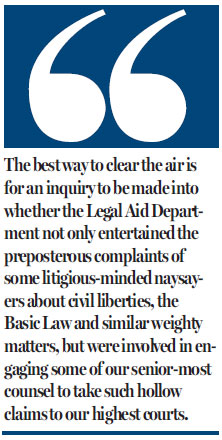Ex-judge hands down a harsh verdict on the SAR's judiciary
Updated: 2015-12-22 09:42
By Albert Lin(HK Edition)
|
|||||||||
The stinging attack made by respected former senior judge Henry Litton on the highest echelons of Hong Kong's legal system has exposed a disturbing situation. It suggests that a gulf of difference might exist between how some of our most senior judges see their responsibilities.
Not only did Litton question what he sees as blatant misuse of the process of judicial review, he was highly caustic not only of the wordiness of judgments handed down by some judges but also of the lack of clarity in those judgments.
As an example of "gross misuse" of judicial reviews he cited the legal aid case brought by a student of the University of Hong Kong, Yvonne Leung Lai-kwok, against the government's constitutional reform package.
By no means did Litton's criticism end there. He went on to point out that the judgment, which ran to more than 100 paragraphs, lacked nothing in verbosity but, in his view, was not clear in its meaning. These "judgments were so obscure that no one can understand them", he said.
Noting that the judgment was handed down in English, he also suggested that since most of our population speak only the Chinese language it might have been more appropriate to deliver it in that language.
Litton also touched on other cases which he believed should never have been given the extreme privilege of a judicial review, including HKTV's case against being denied a free-to-air license.
"The courtroom is the place for the vindication of legal rights, (and) redress for wrongs done," he said. "It is not a debating hall or a classroom."
Few would question whether Litton is sufficiently qualified and experienced to hold such strong opinions. A distinguished graduate in legal studies from Merton College, Oxford, he gave up a busy legal practice in Hong Kong in 1992 to join the judiciary. He served as a permanent judge of the Court of Final Appeal from 1997 to 2000 before becoming a non-permanent judge of that court.
His views suggest that not a few of our well-remunerated senior members of the bench, to say the least, cling to time-honored practices and stodgy interpretations. In another salvo Litton said, "The legal system, in many instances, is wrapped in obscurity, clothed in mumbo jumbo, suffocating under citations and drowning in irrelevance." He also suggested that the judiciary is sleepwalking in a confused "world of authorities, legal texts, customs and black-letter law" while being "detached from the people".
Another concern arising from his revelations is whether certain high-powered (and highly priced) legal luminaries have been gorging at the trough in judicial review cases originating from the government's legal aid system. If this has happened - especially where the claims being made were specious in the extreme - it suggests a massive contradiction of the concept of what the community regard as a most worthy community scheme.
The best way to clear the air is for an inquiry to be made into whether the Legal Aid Department not only entertained the preposterous complaints of some litigious-minded naysayers about civil liberties, the Basic Law and similar weighty matters, but were involved in engaging some of our senior-most counsel to take such hollow claims to our highest courts.
Such a gross overreaction would represent a denial of the concept of legal aid. This can be summed up as being a system where the poorest sectors of the community are given representation in court which they otherwise could never enjoy. It follows that the legal aid applicant's case must be strong enough to offer the likelihood of a favorable result. Further, in general terms, the legal aid ambit was to be limited to relatively minor actions conducted in the lower courts.
Presumably, no legal aid cases would go before a higher court except on those odd occasions when the losing party was so aggrieved over the verdict that they lodged an appeal. But for any legal aid case to attain the dizzy heights of our highest courts borders on the incredible - especially if that action springs from the febrile mind of a troublemaking naysayer, and if that action centers on the powers of our government and freedoms of our citizens.
Legal aid services are supposed to relate to civil and criminal actions involving personal injury litigation, family litigation, wages claims referred by the Labour Department, plus civil cases excepting employee compensation claims.
Once these hurdles have been overcome the applicant must then meet the financial criteria. Not surprisingly these financial parameters are painfully narrow, despite being increased just last July. We certainly would not expect them to cover unjustifiable appeals for judicial reviews in our highest courts.
The author is a journalist and former civil servant.

(HK Edition 12/22/2015 page9)